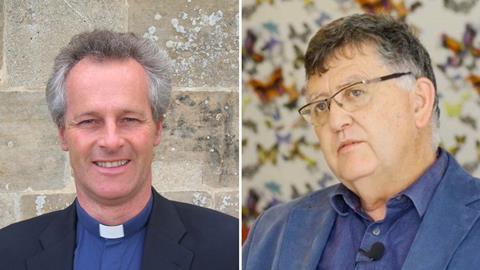Financial institutions are guilty of discriminating against Christians. That’s the claim of Richard Fothergill and Mike Davidson, both of whom are prominent Christians who have recently had their bank accounts closed. Are banks trying to force those with unpopular views out of public life? Tim Wyatt investigates

Are Christians going to be cancelled from public life?
That’s a question more and more believers are asking after a spate of stories in recent weeks.
One vicar had his bank account closed after questioning the bank’s backing of Pride. A Christian charity in Northern Ireland was given a £20,000 settlement after its accounts were shut down following an online campaign. And all this comes as the government prepares to pass a law banning gay conversion therapy, despite warnings this could criminalise traditional Christian teaching and ministry.
Richard Fothergill is an Anglican minister who founded and leads the Filling Station ministry, a regional network of gatherings for Christians. He has had a savings account with Yorkshire Building Society (YBS) for 17 years, but last month had it abruptly closed down. Fothergill says the trouble started after he replied to an email asking for customer feedback. Noticing a Pride flag in the email, he wrote back questioning YBS’s promotion of a pro-LGBT worldview and laying out his Christian objections to some aspects of transgender ideology.
“Is this really the best use of your time and energy to promote a particular worldview,” his message went, he told Premier Christianity. “You’re a bank, you deal with money. Why don’t you concentrate all your people’s energy on that rather than pushing a particular cultural agenda?” But YBS responded with a letter declaring their relationship with him had “irrevocably broken down” and as such they would close his account within two weeks.
This is a freedom of speech issue
“They are a financial house – they are not there to do social engineering,” Fothergill later told The Times. A spokesperson for YBS said they would never close an account due to a customer’s beliefs or feedback, but would if they were “rude, abusive, violent or discriminates in any way, based on the specific facts, comments and behaviour in each case”. But Fothergill rejected the idea he had been discriminatory or abusive and said he believed the bank had cancelled his account because of his Christian convictions around sexuality and gender.
He argued there was a freedom of speech question at the heart of the row – should a financial institution be allowed to un-bank somebody because of their legal but unpopular views? Believing God was asking him to “dig his heels in and speak up”, he contacted the Free Speech Union and has done a round of press interviews to highlight his concerns.
Fothergill’s case against YBS emerged just days after a similar story from Northern Ireland. There, the Core Issues Trust (CIT) – a Christian charity which provides support and counselling for people with unwanted same-sex attractions – accepted a £21,500 settlement from Barclays after they cancelled its bank accounts three years ago. In 2020, LGBT activists had spotted CIT banked with Barclays and, accusing the charity of engaging in conversion therapy, launched a campaign to pressure the bank to close the accounts. In July, Barclays did indeed shut CIT and its international sister organisation’s accounts down, prompting CIT to sue with support from the Christian Legal Centre.
Lawyers claimed Barclays had unlawfully discriminated against the charity, but the bank said it had the right to close anyone’s account and denied any discrimination based on “any religious, philosophical or political belief”. However, shortly before the case was due to be heard at the High Court, it offered CIT £21,500 to settle the case, although without reinstating the bank accounts.
Mike Davidson, the chief executive of CIT who describes himself as “ex-gay”, denied suggestions his charity promoted conversion therapy. The Trust summarises its work as education, mentoring and training around “lifestyle-choices consistent with Christian living”, and “events which appeal to…that portion of the population unhappy with unwanted sexual practices”. Davidson said his case should “serve as a warning to the government of what is coming if it proceeds with publishing and enforcing its ‘conversion therapy’ ban”.
Creeping intolerance?
Some fear Barclays and YSB’s actions presage a growing chilling effect on conservative Christians determined to stand up for their convictions on sexuality and gender. Religion or belief are protected characteristics under the Equality Act and so in theory the law protects Christians from victimisation or discrimination on the grounds of their views. Nevertheless, when it comes to banking in particular, there are many reasons why a bank can shut a customer’s account with limited notice and generally they are not obliged to give a reason. This issue arose recently when Nigel Farage complained that his accounts had been shut abruptly. He believes he was shut out of the financial system because he is deemed to be a “politically-exposed person” and under anti-money laundering rules, banks must apply extra checks on anyone at risk of foreign bribery due to their political activity.
But in the wake of other cases, including Fothergill’s, the Treasury has said it wants to strengthen protections for customers. Lucy Frazer, the culture secretary, said regulators must act to prevent banks from cutting off people with controversial opinions, adding she was “concerned that bank accounts might be closed for the wrong reasons”.
But the issue is bigger than just banks too. The Christian-run bakery Ashers, also from Northern Ireland, found itself in legal trouble a decade ago when a gay activist tried to order a cake with a message promoting same-sex marriage. After Ashers declined, the activist – with the backing of the Equality Commission for Northern Ireland – sued in court and won, and then won again when the bakery appealed. It was only when the case reached the Supreme Court that the Christian family who run Ashers were vindicated, when judges ruled they had not discriminated against the activist because of his sexuality, merely declined to promote an opinion they did not share.
There have also been cases of Christian teachers fired for refusing to use a trans pupil’s new pronouns or for posting on their private Facebook accounts about their unease over compulsory sex education in primary schools. And yet in many cases, legal action eventually resolves in favour of the Christian, with the Equality Act protecting not just holding an unpopular religious belief but also expressing it.
Where this trend goes is not yet clear, but Fothergill told Premier Christianity he hoped a tipping point had been reached. Hundreds of non-Christians and gay people had contacted him to express support since he had gone public, he said, telling him: “This is a freedom of speech issue. You, Richard Fothergill, a reverend, should be allowed to have Christian views and express them publicly and not be slandered or have your bank account removed.”
His story had got significant coverage from multiple national newspapers. More and more people were now pushing back against creeping intolerance from institutions captured by a divisive ideology, he argued, which augured well for Christians. “And that’s been fascinating. So yes, maybe it’s a tipping point. I don’t know…”






































No comments yet